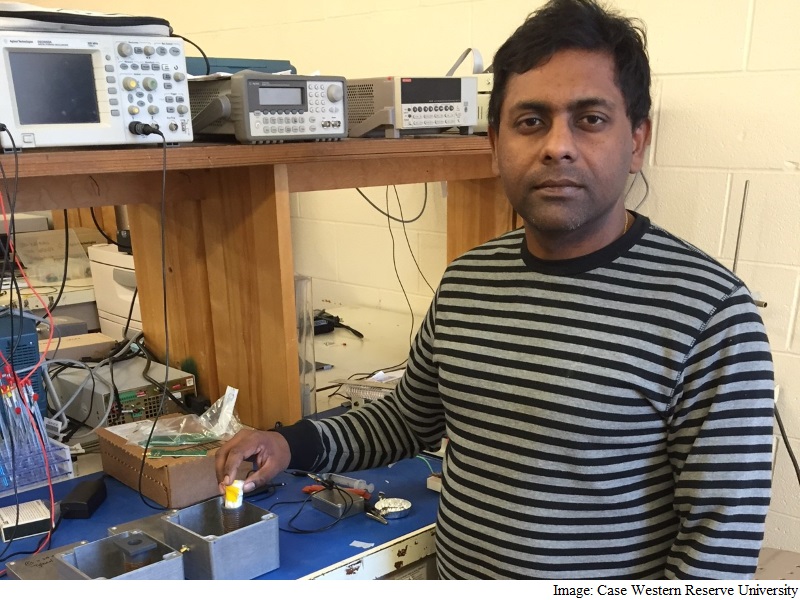- Home
- Science
- Science News
- New Portable Device to Help Detect Tainted Medicines, Supplements
New Portable Device to Help Detect Tainted Medicines, Supplements

"There is a big problem with counterfeit and sub-standard medicines in poorer countries, particularly in Africa and Asia," said Soumyajit Mandal, assistant professor at Case Western Reserve University in Ohio, US.
Mandal and his collaborators are developing a small, box-like detector that has been preliminary tested in field trials.
"Current results are very promising and have advantages over competing methods," Mandal said.
"The required instrumentation is simple and low-cost, compared to other analytical techniques, such as optical spectroscopy," he noted.
The device uses Nuclear Quadrupole Resonance (NQR) spectroscopy, a non-invasive and non-destructive analytical technique for medicines and supplements in pill or powder form.
Mandal's research team proposes what it calls a "chemometric passport approach" for quality assurance.
Data on packaged medicines will be derived from a spectroscopic analysis performed at the point of manufacture.
The contents of the packet will later be authenticated by matching the results of another spectroscopic analysis using unique chemical identifiers from a reference spectrum.
Authentication information can be accessed either from a secure database stored in the cloud, or from information encoded directly within the product barcode. The absence of a match triggers a "contents don't match the label" alarm on the testing device.
Mandal said that capability would be particularly useful at customs checkpoints and postal sorting offices when a barcode might not be visible.
"The work builds on - and improves - a related project introduced in Europe a few years ago to create a portable, low-cost detector for medicines," he said.
Mandal said the detector he and his colleagues are developing is much more flexible (capable of analysing a wide variety of medicines and dietary supplements), and more sensitive or capable of measuring smaller quantities.
The findings will be published in the journal IEEE/ACM Transactions on Computational Biology and Bioinformatics.
Get your daily dose of tech news, reviews, and insights, in under 80 characters on Gadgets 360 Turbo. Connect with fellow tech lovers on our Forum. Follow us on X, Facebook, WhatsApp, Threads and Google News for instant updates. Catch all the action on our YouTube channel.
Related Stories
- Samsung Galaxy Unpacked 2025
- ChatGPT
- Redmi Note 14 Pro+
- iPhone 16
- Apple Vision Pro
- Oneplus 12
- OnePlus Nord CE 3 Lite 5G
- iPhone 13
- Xiaomi 14 Pro
- Oppo Find N3
- Tecno Spark Go (2023)
- Realme V30
- Best Phones Under 25000
- Samsung Galaxy S24 Series
- Cryptocurrency
- iQoo 12
- Samsung Galaxy S24 Ultra
- Giottus
- Samsung Galaxy Z Flip 5
- Apple 'Scary Fast'
- Housefull 5
- GoPro Hero 12 Black Review
- Invincible Season 2
- JioGlass
- HD Ready TV
- Laptop Under 50000
- Smartwatch Under 10000
- Latest Mobile Phones
- Compare Phones
- OPPO A6v 5G
- OPPO A6i+ 5G
- Realme 16 5G
- Redmi Turbo 5
- Redmi Turbo 5 Max
- Moto G77
- Moto G67
- Realme P4 Power 5G
- HP HyperX Omen 15
- Acer Chromebook 311 (2026)
- Lenovo Idea Tab Plus
- Realme Pad 3
- HMD Watch P1
- HMD Watch X1
- Haier H5E Series
- Acerpure Nitro Z Series 100-inch QLED TV
- Asus ROG Ally
- Nintendo Switch Lite
- Haier 1.6 Ton 5 Star Inverter Split AC (HSU19G-MZAID5BN-INV)
- Haier 1.6 Ton 5 Star Inverter Split AC (HSU19G-MZAIM5BN-INV)

















